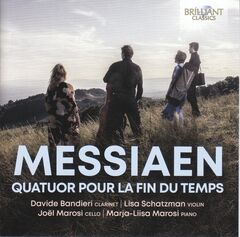Dieses von der Geheimen Offenbarung des Johannes inspirierte Werk zur Erinnerung an jenen Engel der Offenbarung, der, die Hände zum Himmel erhoben, das Ende jeglicher Zeit verkündet, hat eine spezielle Entstehungsgeschichte, aus der sich auch die Besetzung und Gestaltung erklären lässt.
Messiaen vollendete das Quartett als Insasse des im Görlitzer Stadtteil Moys gelegenen deutschen Kriegsgefangenenlagers Stalag VIII-A Ende 1940/Anfang 1941. Die Lagerkommandanten hatten Messiaen ermöglicht zu komponieren. Die ungewöhnliche Instrumentierung ergab sich aus den im Lager verfügbaren Musikern.
Den Interpreten gelingt es mit feinem Einsatz für dieses Werk, die im Wesentlichen körperlose, geistige, katholische musikalische Sprache auszudrücken. Mit thematischen Motiven, die melodisch und harmonisch eine Art tonale Allgegenwart ergeben, führen sie den Hörer der Ewigkeit in Raum und Unendlichkeit näher.
Das Solo der Klarinette im dritten Satz gestaltet Davide Bandieri aus einer Traurigkeit und Müdigkeit heraus eindrucksvoll als Verlangen nach Licht, Sternen und Regenbögen sowie jubilierenden Stimmen. Im fünften Satz verherrlicht Cellist Joël Marosi mit unendlicher Langsamkeit wie in Liebe und Ehrerbietung die Ewigkeit des Wortes Jesus. Majestätisch breitet er die Melodie wie in einer zarten und unbegrenzten Ferne aus.
Geigerin Lisa Schatzman kann mit einem breit angelegten Geigensolo im achten Satz das Lob auf die Unsterblichkeit Jesu, das Gegenstück zum Cellosolo des 5. Satzes, als Liebesgesang auskosten. Im Zusammenspiel aller vier Instrumente, beispielsweise im sechsten Satz, ahmen die Musiker unisono die Gongs und Trompeten der Apokalypse nach. Ob Duo, Trio oder eben im Quartett, die Musiker zeigen in allen Kombinationen ihr ausgeprägtes Gespür für dieses Werk. So kann sich auch Pianistin Marja-Liisa Marosi entsprechend mit dem einen oder anderen instrumentalen Partner zusammen zur prägenden Formung einbringen.
This work, inspired by the Secret Revelation of St. John, in memory of the angel of Revelation who, raising his hands to heaven, proclaims the end of all time, has a special genesis, which also explains the scoring and arrangement. Messiaen completed the quartet as an inmate of the German prisoner-of-war camp Stalag VIII-A in the Moys district of Görlitz at the end of 1940/beginning of 1941. The camp commanders had made it possible for Messiaen to compose. The unusual instrumentation resulted from the musicians available in the camp.
The performers succeed in expressing the essentially disembodied, spiritual, catholic musical language with a fine commitment to this work. With thematic motifs that melodically and harmonically create a kind of tonal omnipresence, they lead the listener closer to eternity in space and infinity.
Davide Bandieri impressively shapes the clarinet solo in the third movement out of a sadness and weariness as a longing for light, stars and rainbows as well as jubilant voices. In the fifth movement, cellist Joël Marosi glorifies the eternity of the word Jesus with infinite slowness, as if in love and reverence. He majestically expands the melody as if in a tender and infinite distance.
With a broad violin solo in the eighth movement, violinist Lisa Schatzman can savor the praise of Jesus’ immortality, the counterpart to the cello solo in the fifth movement, as a song of love. In the interplay of all four instruments, for example in the sixth movement, the musicians imitate the gongs and trumpets of the Apocalypse in unison. Whether as a duo, trio or quartet, the musicians demonstrate their distinctive feel for this work in all combinations. Pianist Marja-Liisa Marosi can also contribute to the formative shaping together with one or other instrumental partner.




















